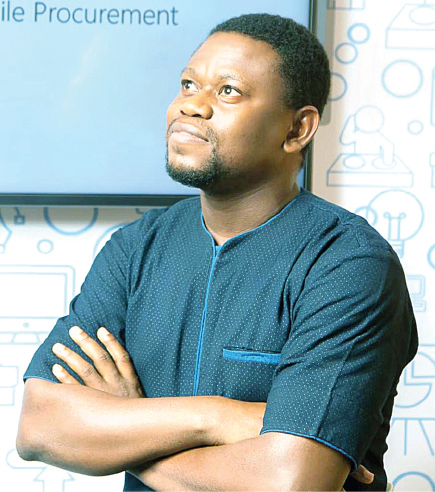Oluwagbenga Olatoye is the co-founder of PM Group Nigeria and he is helping to redefine the project management industry in Nigeria. In this interview with KINGSLEY ALUMONA, he speaks on why all businesses and organisations need project managers and how technology could help in redefining the Nigerian project.
What do you do?
I’m a technology product and project manager and also a digital transformation evangelist. I’m a co-founder of PM Group Nigeria—a community of product and project management professionals. I help organisations deliver their IT products and project goals; as well as engage in raising talents, who can do same. I also help organisations see areas of their businesses where technology can come as an enabler for better performance.
Do you have any special certifications that qualify you as an IT product and project manager?
I’ve the Project Management Professional (PMP) certification from Project Management Institute, USA. I’ve Information Technology Infrastructure Library (ITIL) and Professional Scrum Master (PSM) certifications and a host of other trainings. They all point to my capacity, knowledge and experience in delivering technology projects as well as my ability to lead and guide organisations into adopting the scrum agile framework for effective product and project delivery.
Do you think all technology-focused businesses or organisations really need product and project managers?
All technology-product focused organisations need product and project managers. Project managers are at the core of the moving parts when it comes to project delivery—from how to identify and manage stakeholders, to how they manage communication, risks and other metrics that contribute to the completion of the project. They are able to see the direction the project is going and initiate necessary actions to ensure its successful delivery. A product manager, on the other hand, is the CEO of the product. He is able to envision the overall objective of the product and build a roadmap around it to ensure that a product the end-user wants is built.
What unique advantages do product/project managers offer businesses or organisations?
Project management is such an interesting field that you’ve to be deep in continuous learning to succeed, be it from your own experience or from experiences other colleagues have garnered. The question today is no longer whether or not there is need for project and product managers as they, on a daily basis, have proven their well-regarded value to the growth of businesses—be it in startup or at enterprise level. Rather, I think the focus should be about the need for a community of practise where people can learn from each other to build their capacity to the point they can manage multiple projects or products concurrently.
You have engagements with eTranzact. Tell us about the company and your work description there?
eTranzact is the foremost payment platform in Nigeria. We’re the simpler, safer and easier way to complete financial transactions—either online or offline. My role at eTranzact bothers around programme management and scrum mastery for effective delivery of our on-going platform improvement programmes.
What is the inspiration behind the establishment of PM Group Nigeria and what is it about?
Perhaps, the agony from the number of failed projects we see all around us today birthed the PM Group Nigeria. We believe we can change that, from inside-out, by raising professionals who can lead organisations into proper analysis and management of various metrics that would lead to successful project delivery.
PM Group is a community with one objective—which is to raise true professionals. We do this by employing three strategies: we relive our everyday life in a way of mentorship and learning from each other, we help those who’re looking to pivot into product and project management do that without hassle, and we open our members to opportunities within the space.
How accessible and affordable are these offerings?
Joining PM Group is free and open to everyone. The only requirement is that we look for people who’re willing to contribute their experiences for others to learn from. No matter the level you are, whether as a veteran or newbie, we believe you’ve something others can learn from, and the willingness to give it is a key factor we look for.
I’m a firm believer in the power of community. So, having a community of product and project management professionals is unleashing the power to cause change in the industry.
Who are the categories of people qualified for PM Group training?
Anyone looking for avenue to build a product and/or project management career within the digital technology niche market will benefit from our activities. We learn from each other what it takes to deliver products and projects successfully. We see ourselves as change agents, individuals who’re able to go out to not only practice, but to also teach others what is right.
In this digital age, what kind of technology or innovation does your organisation leverage on, in training its members and providing services to its clients?
Most of our members work within the digital technology space. Hence, our training are online in form of webinars, which are based on knowledge area within our digital technology niche market, lessons learnt from past projects, and role play; where we paint a typical scenario of a project life and we analyse the ups and downs and what could have been done better.
There are many IT product and project management training firms in the country, what is distinct about your organisation?
We’re actually not in competition with training organisations—at least, not at the moment. We’re a group of people who’re not satisfied with the status-quo and are determined to do something about it by helping fellow colleagues (or aspiring ones) become better and find their feet in the industry. We bring veteran project managers and newbies together to learn new and better ways of managing projects and delivering products, especially now that we’re in virtual era.
Going by the aim of ‘The Nigerian Project’, as a project manager, if you are opportune to play a role what will do to boost the economic and technological advancement of the country?
I would start with planning how to get my most important stakeholders (Nigerian citizens) to understand and believe in my project first, and leveraging on technology will help me achieve that faster. The Nigerian Project as we’ve it today is not doing much of that. What we’ve are stakeholders who either don’t understand the project or don’t believe in it. Over 77 per cent of Nigerians have mobile phones. 43 per cent of Nigerians are below 14 years of age; over 70 per cent are below 30 years; and 97 per cent are below 64 years. The data is there. We don’t need to build a giant infrastructure to get the message home to these demographics.
Then for us to be successful at such project, one that is industrial 4.0 compliant, our public-private partnership (PPP) must definitely go beyond what we’ve today. We need to bring our best brains, especially in the digital technology space, into it.
What impact do you think your current and future members could make in the Nigerian Project and development?
Let’s imagine the impacts over 60 professionals in different organisations would have on their respective organisations’ revenues, when these organisations no longer have to abandon projects due to poor estimation/coordination, no longer have to deliver projects over the budget and/or build what no one needs? Now, let’s cascade that into the larger Nigeria’s tech ecosystem—when Lagos startup ecosystem alone is valued at over $2 billion. The effect on Nigeria economy is huge.
In 10 years, with your work in PM Group, how many people do you think your community could train into product/project managers?
I believe there is no limit to how big we can be as a community, and no geographical boundaries can limit us since we do virtual trainings. In fact, we currently have members who reside outside Africa among us and that brings diversity into it, as we get to examine product and project management in relations to different cultures and believes. So, apart from the fact that our members hold globally recognised certifications and are managing projects across different geographical zones, you’re sure that whatever you’re learning from the community is obtainable at the global scale and anywhere in the world.
We started about two years ago, specifically in 2019 and we’ve grown to over 60 active members. Many of our members have gotten (or moved to better) jobs via referrers from the group, many got promoted because they can deliver results faster and better after joining us.
YOU SHOULD NOT MISS THESE HEADLINES FROM NIGERIAN TRIBUNE
We Have Not Had Water Supply In Months ― Abeokuta Residents
In spite of the huge investment in the water sector by the government and international organisations, water scarcity has grown to become a perennial nightmare for residents of Abeokuta, the Ogun State capital. This report x-rays the lives and experiences of residents in getting clean, potable and affordable water amidst the surge of COVID-19 cases in the state.






